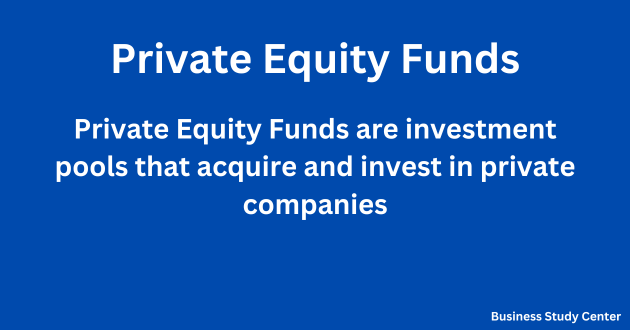
Introduction
Private equity funds have gained significant prominence in the world of finance, offering investors the opportunity for high returns through strategic investments in private companies. In this comprehensive guide, we will delve into the intricacies of private equity funds, exploring their nature, investment strategies, and the factors that investors should consider. So, let’s begin our journey into the world of private equity funds.
Understanding Private Equity Funds
Private equity funds are investment vehicles managed by private equity firms, also known as advisers. Similar to mutual funds or hedge funds, these funds pool money from various investors and utilize it to make investments on behalf of the fund. However, unlike mutual funds or hedge funds, private equity firms primarily focus on long-term investment opportunities, with investment horizons typically spanning 10 years or more.
Private equity funds adopt various investment strategies, with the most common approach being to acquire a controlling interest in an operating company or business, known as a portfolio company. By actively engaging in the management and direction of the portfolio company, private equity firms aim to increase its value over time. Additionally, some private equity funds specialize in minority investments in fast-growing companies or startups.
Who Can Invest in Private Equity Funds?
Private equity funds are typically open to accredited investors and qualified clients, including institutional investors such as insurance companies, university endowments, and pension funds, as well as high-income individuals with substantial net worth. It’s worth noting that the initial investment amount for private equity funds is often quite high. However, even if you are not directly invested in private equity funds, you may have indirect exposure through pension plans or insurance policies, as these entities often allocate a portion of their portfolios to private equity funds.
Key Considerations for Investors
Illiquidity
Investing in private equity funds entails a certain level of illiquidity. Unlike publicly traded securities, private equity investments are typically held for several years before generating a return. Investors should be prepared to commit their capital for an extended period and understand that there may be limitations on their ability to withdraw their investment. This illiquidity factor is particularly important for institutional investors, as private equity investments often represent a small portion of their diversified portfolios.
Fees and Expenses
When investing in private equity funds, it is crucial to carefully evaluate the fees and expenses associated with the investment. Private equity firms disclose these fees and expenses in offering documents and agreements. The Securities and Exchange Commission (SEC) has taken enforcement actions against firms that have incurred fees and expenses without adequate consent or disclosure. Investors should be vigilant in understanding these costs and their impact on their investment returns.
Additionally, private equity firms may manage multiple funds invested in various portfolio companies. As fiduciaries, they have a legal obligation to allocate expenses among themselves, their funds, and the portfolio companies in a manner that aligns with their fiduciary duty. The SEC has brought enforcement actions related to the shifting and allocation of expenses, emphasizing the importance of transparency and fair practices in managing private equity funds.
Conflicts of Interest
Private equity firms often face conflicts of interest due to their multiple roles and relationships within the investment ecosystem. They may manage multiple funds while also providing services to portfolio companies. These dual roles can create conflicts that need to be disclosed and managed appropriately. The SEC has taken enforcement actions against firms that have failed to disclose certain conflicts of interest to the funds they manage. Investors should be aware of potential conflicts and ensure that the private equity firm has transparently disclosed and managed these conflicts.
Types of Private Equity Funds
Private equity funds can be categorized into two primary types: venture capital (VC) funds and buyout or leveraged buyout (LBO) funds.
Venture Capital (VC) Funds
Venture capital funds focus on investing in small, early-stage, and emerging businesses with high growth potential. These funds provide crucial capital to startups that may have limited access to other forms of financing. While venture capital investments carry higher risks due to the uncertain nature of emerging businesses, they can also yield exceptional returns for investors.
Buyout or Leveraged Buyout (LBO) Funds
Buyout or leveraged buyout funds target more mature businesses, often acquiring a controlling interest in the company. LBO funds employ significant leverage to enhance their return on investment. These funds are typically larger in size compared to venture capital funds and aim to optimize the value of the acquired company within a specific investment horizon.
Exiting Private Equity Investments
Exiting a private equity investment is a crucial consideration for investors. Private equity firms employ various exit strategies to generate returns for their investors. Some common exit routes include:
- Trade sale: The portfolio company is sold to another buyer, either another private equity firm or a strategic buyer.
- Leveraged buyout (LBO): The portfolio company is acquired by another private equity firm.
- Share repurchase: The private equity firm repurchases its own shares in the portfolio company.
- Private placement: Another investor purchases a portion of the business, providing liquidity to the private equity firm.
- Corporate restructuring: External investors acquire a stake in the business, increasing their ownership alongside the private equity firm.
- Flotation or IPO: The company goes public, and private equity firms gradually sell their remaining ownership stake in the business.
Each exit route has its own advantages and considerations, and the choice of strategy depends on various factors, including the investment horizon, management readiness, capital structure, and potential acquirers.
Conclusion
Private equity funds offer investors the opportunity to participate in long-term investments with the potential for high returns. Understanding the nature of private equity funds, the investment strategies employed, and the associated risks and considerations is crucial for investors who wish to explore this asset class. By carefully evaluating the illiquidity, fees and expenses, and conflicts of interest, investors can make informed decisions and maximize their chances of success in the private equity market.
Remember, private equity funds are complex investment vehicles, and it is advisable to seek professional advice from financial advisors or consultants with expertise in this field before making any investment decisions.
Additional Information:
- Private equity funds are subject to regulatory oversight by the SEC, and investors should ensure that the funds and their advisers are compliant with regulatory requirements.
- Private equity investments often involve significant due diligence and analysis to assess the potential risks and rewards associated with a particular investment opportunity.
- Diversification is key in private equity investing, as it helps to mitigate the risks associated with individual investments.
- Private equity funds play a crucial role in fostering entrepreneurship, innovation, and economic growth by providing capital to businesses at various stages of development.
Disclaimer: This article provides general information and should not be considered as financial advice. Investors should conduct their own research and consult with financial professionals before making any investment decisions.


